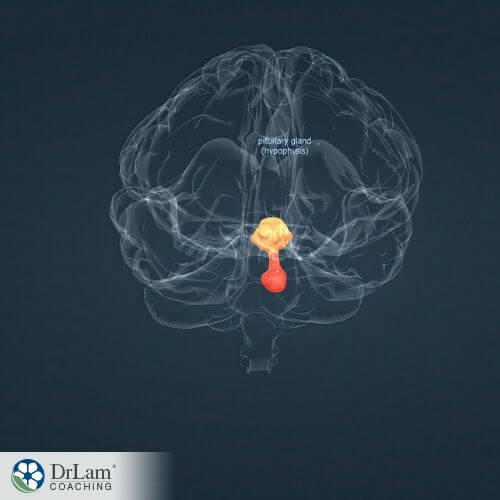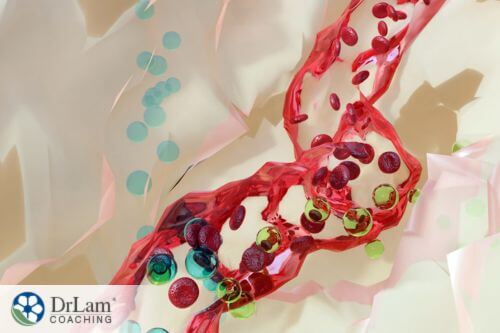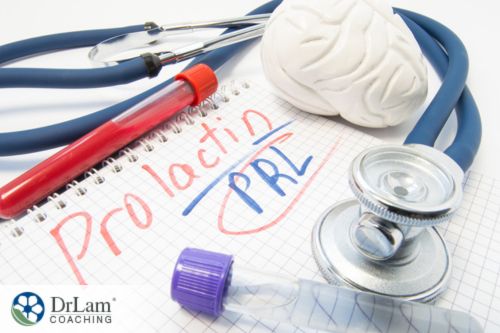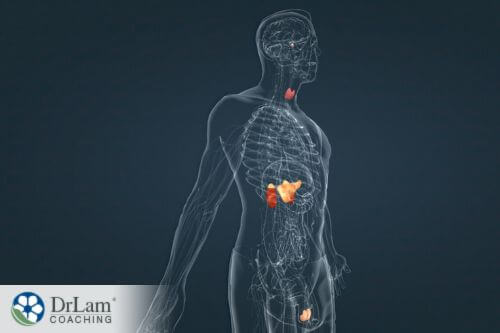The pituitary gland is found below the hypothalamus and is part of the endocrine system. It's responsible for making a variety of hormones. So what exactly are the pituitary hormones, how do they play a part in the HPA axis, and what happens when there is an imbalance?
A hormone is a chemical messenger in the body typically produced by specialist cells, primarily within an endocrine gland. It’s commonly called a "chemical messenger." It travels through the blood to different organs, skin, muscles, and other tissues in the body. Hormones function as an internal communication method between cells throughout the body.
 Also referred to as the hypophysis, the pituitary gland is a small, pea-sized gland situated at the base of the brain. It is positioned in a small chamber called the sella turcica. It’s a part of your endocrine system and is in charge of making several essential hormones. It is divided into the anterior pituitary gland and posterior pituitary gland.
Also referred to as the hypophysis, the pituitary gland is a small, pea-sized gland situated at the base of the brain. It is positioned in a small chamber called the sella turcica. It’s a part of your endocrine system and is in charge of making several essential hormones. It is divided into the anterior pituitary gland and posterior pituitary gland.
The hormones produced by the pituitary gland help regulate various bodily functions and activities. These include body temperature, urination, sleep, puberty, heartbeat, fertility, appetite, growth, and thirst, among others. The pituitary gland communicates with other endocrine system glands or target organs to release hormones.
The anterior pituitary gland secretes four hormones that are responsible for regulating the functions of other endocrine glands in the body. Included in this category of hormones are:
Furthermore, the anterior lobe secretes:
These hormones have a direct impact on specific organs.
The posterior pituitary gland stores:
Secretion of these hormones is dependent on the body’s needs.
ACTH is critical in the body’s response to stress and is important in stimulating the adrenal glands to create the "stress hormone" cortisol. Metabolic regulation, blood pressure maintenance, blood glucose level regulation, and the reduction of inflammation are all key things for which cortisol is responsible. Furthermore, cortisol is important in the body’s "fight or flight" response to the perception of threats.
Too much ACTH in the body can cause Cushing’s syndrome, while low ACTH levels can lead to adrenal insufficiency.
Gonadotrophin-releasing hormone is created and secreted by specialized nerve cells found in the hypothalamus. It regulates the production of both luteinizing hormone (LH) and follicle-stimulating hormone (FSH). These hormones help the testes and ovaries in the maintenance of their reproductive functions and control the levels of hormones (like testosterone, oestradiol, and progesterone) they produce.
Gonadotrophin-releasing hormone levels are extremely low in childhood. However, they increase during puberty, which stimulates sexual maturation.
FSH and LH production is regulated by the hypothalamic–pituitary–gonadal (HPG) axis, which plays a significant role in the number of circulating hormones secreted by the ovaries and testes. When released, the hormones (FSH and LH) bind to receptors in the anterior pituitary gland. This stimulates the synthesis and release of these hormones.
When the levels of the hormones testosterone (in men) and estrogen and progesterone (in women) are high, GRH declines. On the other hand, when these hormones are low, GRH increases. However, a significant increase in GRH secretion can occur in women that are at the midpoint of their menstrual cycle. As a result, LH increases, which triggers ovulation and the release of a mature egg. At the end of a menstrual cycle, GRH increases gradually as progesterone levels decline.
FSH is commonly referred to as a gonadotrophic hormone. For persons to which male is assigned at birth, FSH is responsible for triggering sperm production (spermatogenesis) and supporting their maturation. It also plays a role in the female reproductive system by stimulating the ovaries to create estrogen. Also, FSH is critical to egg development and maturation in persons identified as biologically female at birth.
 Abnormal production of FSH can cause issues such as infertility, menstrual problems, and sexual malfunction. Too much FSH can lead to hypergonadotrophic-hypogonadism, which is characteristic of the gonads' failure to produce enough estrogen and testosterone. This tends to stem from a loss of negative feedback on the pituitary gland. When this happens, both follicle-stimulating hormone and luteinizing hormone levels will increase.
Abnormal production of FSH can cause issues such as infertility, menstrual problems, and sexual malfunction. Too much FSH can lead to hypergonadotrophic-hypogonadism, which is characteristic of the gonads' failure to produce enough estrogen and testosterone. This tends to stem from a loss of negative feedback on the pituitary gland. When this happens, both follicle-stimulating hormone and luteinizing hormone levels will increase.
Conditions like Klinefelter's syndrome in men and Turner syndrome in women are linked to this issue.
Too little FSH, on the other hand, tends to lead to abnormal development at puberty and ovarian insufficiency. Infertility often results because the abnormal growth of ovarian follicles causes them not to release eggs.
LH is one of the pituitary hormones that's sometimes referred to as a gonadotrophic hormone. It plays a critical role in stimulating ovulation in persons assigned female at birth and the production of testosterone in persons identified as biologically male at birth. Abnormal production of LH can lead to problems related to infertility, abnormal menstruation, and sexual malfunction.
Too much LH can cause a decrease in sex steroid production from the testes or ovaries and consequently infertility. Polycystic ovary syndrome, for instance, is a typical condition in women linked to high levels of LH. In men, Klinefelter’s syndrome is a male-only disorder that can develop from excess LH. It's often seen in men carrying an extra X chromosome and can lead to small testes and inadequate testosterone levels to produce sperm.
Furthermore, too little LH can also result in both male or female-related infertility. With too little LH, there is a lack of support for testicular or ovarian function. Hypothalamic amenorrhoea is an example of a condition that can result from a lack of LH.
GH, one of the pituitary hormones, is vital in the development of children and functions to stimulate growth. It aids children in growing taller. In adults, this hormone also aids in the maintenance of healthy muscles, tissues, organs, and bones. Additionally, it affects fat distribution and metabolism in adults and children as well.
GH is released in several ‘bursts’ or pulses every three to five hours. It's controlled by two other hormones: growth hormone-releasing hormone (GHRH) and somatostatin. GHRH stimulates the pituitary gland to secrete growth hormone, while somatostatin prevents its secretion. Exercise, sleep, stress, and low glucose increases GH, and this occurs during puberty as well. There's a decline in GH during pregnancy.
If adults have too much GH, it can lead to acromegaly, which causes enlarged bones, organs, hands, feet, and abnormal facial characteristics. In contrast, children with too much GH experience gigantism, which causes abnormally large growth. On the other hand, too little GH can cause abnormally slow growth and short stature in children. Adults may experience weight gain and a worsening risk of heart disease, as well as weak bones, muscles, and heart.
Prolactin is essential in lactation stimulation following birth. Also, in adults, this hormone impacts fertility and sexual function.
 The hormone dopamine is largely responsible for regulating the production of prolactin, limiting the production of prolactin. Also, estrogen plays a crucial regulatory role, increasing the amount of prolactin produced and secreted. Furthermore, other pituitary hormones can increase and decrease the levels of prolactin secreted in the body. These include anti-diuretic hormones and oxytocin.
The hormone dopamine is largely responsible for regulating the production of prolactin, limiting the production of prolactin. Also, estrogen plays a crucial regulatory role, increasing the amount of prolactin produced and secreted. Furthermore, other pituitary hormones can increase and decrease the levels of prolactin secreted in the body. These include anti-diuretic hormones and oxytocin.
The ovary and testicles may not function at optimal levels if there’s a high level of prolactin in the body. Too much prolactin can result in a condition referred to as hyperprolactinemia. Symptoms can include unwanted lactation, an abnormal menstrual cycle, and symptoms linked to too little estrogen or too little testosterone.
On the other hand, too little prolactin can lead to the development of hypoprolactinemia, a rare condition. This can cause insufficient lactation following delivery.
TSH is responsible for stimulating the thyroid to create thyroid hormones that are critical in controlling your body’s metabolism, growth, nervous system, and energy homeostasis.
The hypothalamus is responsible for creating thyrotropin-releasing hormone (TRH), which triggers the pituitary gland to produce TSH. Both the hypothalamus and pituitary gland act on the level of thyroid hormone present in the body. As such, the response is the regulation of the level of TSH from the pituitary gland and the level of TRH secreted from the hypothalamus to support the proper maintenance of the hormone.
Too much TSH can lead to a condition called hyperthyroidism. Persons with this condition are often characterized as having an overactive thyroid. An excess of this hormone can lead to symptoms including a drop in weight, increased appetite, and rapid or irregular heartbeat.
On the other hand, too little TSH often stems from your thyroid gland producing excess thyroid hormone. The response of the pituitary gland is to produce less TSH, which is appropriate.
Also called vasopressin, ADH is crucial in the regulation of the water balance in the body, and specifically, water retention by the kidney. It further regulates mineral concentrations, like sodium, in the body.
Secretion of anti-diuretic hormone is controlled by factors that include a drop in blood volume or decreased blood pressure. These events can take place when experiencing dehydration or a hemorrhage and trigger anti-diuretic hormone release.
Excess anti-diuretic hormone can result in the kidneys retaining water. Also, a condition referred to as the syndrome of inappropriate anti-diuretic hormone secretion (SIADH) is characterized by excess anti-diuretic hormone secretion when there is no need for it.
A few things can happen if you have too little anti-diuretic hormone levels, such as your kidneys excreting too much water. Consequently, you could urinate more frequently, and in turn, become dehydrated and see your blood pressure drop.
In persons identified as female at birth, oxytocin plays an important role in labor by helping the process to progress. This means that, during childbirth, oxytocin sends signals to the uterus to contract. Also, this hormone stimulates the flow of breast milk and further impact the bond between mother and baby. In biologically assigned males, this hormone helps sperm travel.
Oxytocin creation and release are controlled by a positive feedback mechanism. This involves the release of the hormone and it triggering more release of itself.
An excess of oxytocin has been connected to benign prostatic hyperplasia. This is a condition that impacts the prostate and occurs mostly in men over 60 years of age. One symptom can be difficulty urinating.
In contrast, there remains some mystery about the actual effects of low oxytocin. There appears to be a link between too little oxytocin and autism and autistic spectrum disorders. It may also be low in nursing mothers with inadequate breast milk production.
 Three crucial organs in the Hormone Circuit of the NeuroEndoMetabolic (NEM) Stress Response model help with regulating hormones. They are the adrenal glands, thyroid glands, and reproductive organs. They are involved in processes in the body such as metabolism, energy production, and reproduction.
Three crucial organs in the Hormone Circuit of the NeuroEndoMetabolic (NEM) Stress Response model help with regulating hormones. They are the adrenal glands, thyroid glands, and reproductive organs. They are involved in processes in the body such as metabolism, energy production, and reproduction.
However, hormone imbalances can impact these bodily functions and result in certain health issues. Chronic stress can cause the adrenal glands to become fatigued and prevent them from creating an adequate amount of natural hormones, like the "stress hormone" cortisol. In this instance, Adrenal Fatigue Syndrome (AFS) can develop.
An imbalance in the hormone circuit has the potential to impact the pituitary hormones. This can result in issues related to fertility, libido, weight, high blood pressure, growth and development, among other issues. If you suspect that you are experiencing hormonal imbalance, visit your physician.
If your pituitary hormones are imbalanced, there are several ways to restore balance and get back on track. It's critical that you speak to your physician to arrive at the best solution for your unique hormone issues.
Fixing hormonal imbalance can take several forms:
Pituitary hormones play a key role in many bodily functions. As such, it's essential that these hormones are kept balanced to support your overall health. However, there are instances in which these hormone levels can increase or decrease.
If you think that you are experiencing, hormone-related health issues, speak to your doctor. Get a proper assessment at your healthcare provider’s office if you are unsure about your hormone health.
If you are concerned about hormone imbalance and would like assistance in determining natural ways to restore hormone balance, the team at Dr. Lam Coaching can help. We offer a free** no-obligation phone consultation at +1 (626) 571-1234 where we will privately discuss your symptoms and various options. You can also send us a question through our Ask The Doctor system by clicking here.
Pituitary hormones are produced by the pituitary glands and support metabolism, fertility, growth, and other processes in the body. These hormones include gonadotrophin-releasing hormone, follicle-stimulating hormone, luteinizing hormone, corticotrophin-releasing hormone, prolactin, oxytocin, and others. Exercise, a nutrient-rich diet, hormone therapy, and keeping stress low can help to keep them balanced.
